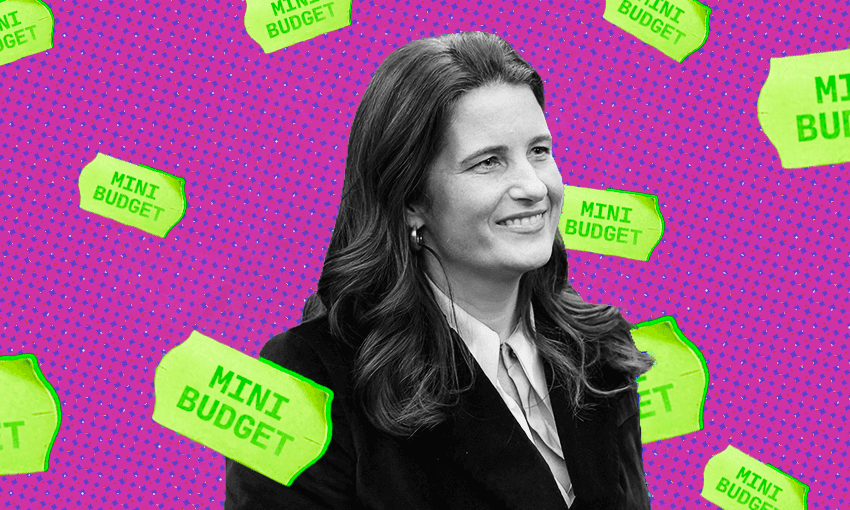It was Nicola Willis’s first big swing as finance minister, and we still don’t know what to call it. Joel MacManus reports.
“We have drinks and some modest biscuits, at no charge,” said Treasury’s Bryan McDaniel as he welcomed the crowd of journalists and economists into the mini budget lockup in Parliament’s banquet hall.
The snacks were indeed modest. A couple of plates of biscuit selections, and a big keg of filter coffee. It was perhaps the first sign that this budget was looking tight. At least the ginger kisses had a generous helping of cream filling.
Inside the room were 16 rows of tables, each shrouded in a white tablecloth. A who’s-who of journalists and media sat shoulder to shoulder, all facing centre stage. We were there to look at the government’s books, having been given a two hour head start before they were officially released. Treasury officials checked everyone’s phone and laptop to make sure they were in flight mode – a security measure to guard against the leaking of financially sensitive details. Once the doors were closed, no person or information could leave the room.
Treasury secretary Caralee McLiesh broke the bad news. The economy was in worse shape than they previously thought. The last treasury analysis was the pre-election fiscal update (Prefu, pronounced Pre-Foo), released on September 12. This was the half-year economic and fiscal update (Hyefu, pronounced Hyee-Foo).
Almost every economic indicator had got worse since September, McLeish said. The only bright side was strong net migration – 129,800 people moved to New Zealand this year – but that had its downsides too. More people meant more demand and therefore more inflation pressure.
“Thank you and kia ora,” she concluded, notably placing the English first, in case anyone was confused.
Nicola Willis arrived at 12.06pm, six minutes late, rocking her trademark pink pantsuit. Her top priority, it seemed, was throwing as much shade on Grant Robertson as possible. “Fiscally reckless”, “fiscal vandalism”, and “economic mismanagement” were some of her favourite descriptors of the last regime.
“Fiscal cliffs” was the word of the day – Willis was upset that Robertson had funded some government programmes for only a set period, despite “clear public expectation” they would continue.
There wasn’t anything too surprising in the budget itself. Willis had found $7.4 billion in savings by following through on various campaign promises, and the home-owning class got their tax cuts thanks to the bright-line test being moved back to two years.
There was still no indication of how National would pay for their promised tax cuts of up to $250 per fortnight for the “average household” (which turned out only to be 3000 households nationwide). Willis said the savings were a “down payment” towards the tax cuts. In other words, she’s still trying to find the money.
When asked if there was announcing anything new, she responded: “Yes, I’m announcing that an era of economic mismanagement is over.” (Short answer: no.)
The big question of the day was what to call the budget. The sticker on the top right corner of the white folder handed to journalists read “MINI BUDGET 2023’. The lead-up to budget day was full of speculation about whether this was all just a game of expectations management. Labour’s Grant Robertson mocked it as a “micro budget” and a “nano budget”.
It was definitely mini: just eight stapled black and white pages. “It’s the mini-mini-mini budget,” Willis insisted, when asked to give it a name.
Forty minutes after the lockup ended and the nation’s media were released back into the wild, Robertson held court on parliament’s checkerboard tiles. He attempted to rebrand it as “the nothingburger budget”. James Shaw was tossed a softball opportunity to give it his own snarky name, but he couldn’t think of anything. “I don’t have one,” he admitted, looking flustered and slightly embarrassed.
The mini/mini-mini-mini/nothingburger budget ended up being mostly a bunch of positioning and finger-pointing. Willis tried to cast blame on the previous government for all the economic ills of this country, and Labour threw dirt about lack of detail.
In the house that afternoon, Willis was pushing back on Labour’s criticism. “What New Zealanders care about is the size of the sausage not how it’s delivered, and how we will deliver it–,” she began, laughter erupting as the finance minister realised what she had said. She put an open palm to her face. “Mr Speaker, it’s been a year of bad quotes from me.”
On her way out of the house, Willis stopped by The Spinoff’s parliamentary office (more of a broom cupboard), and we asked her once more about the name. “I think it will forever be known as the sausage budget now,” she said.





